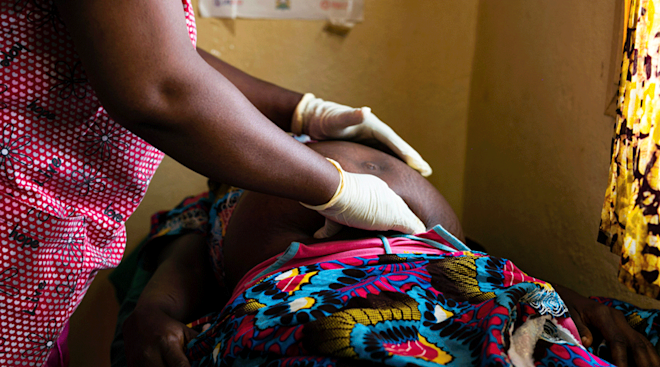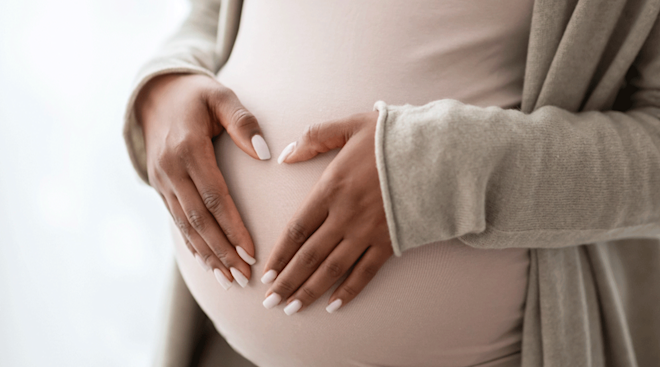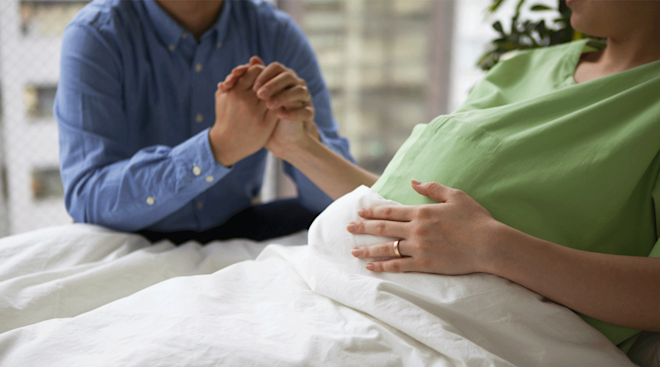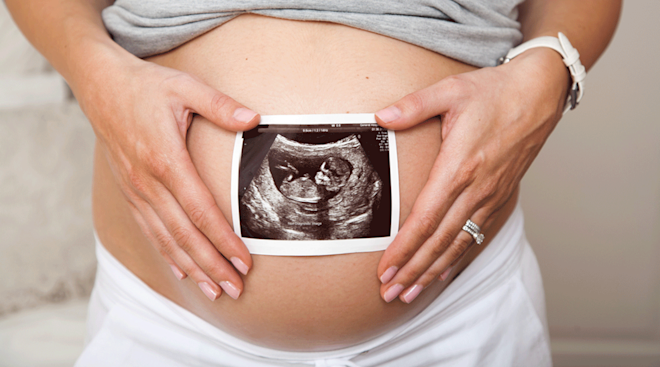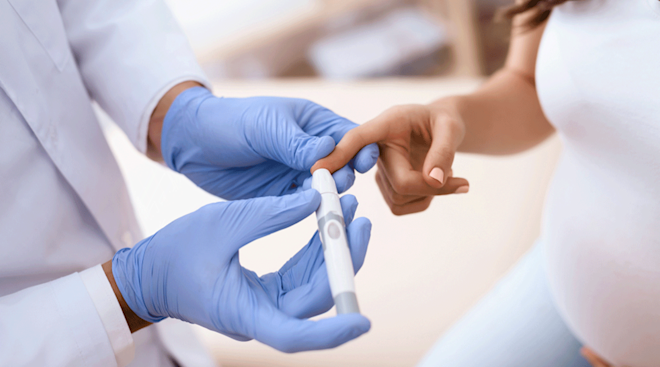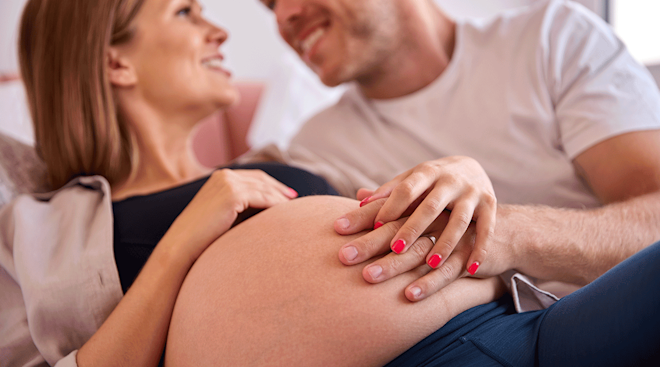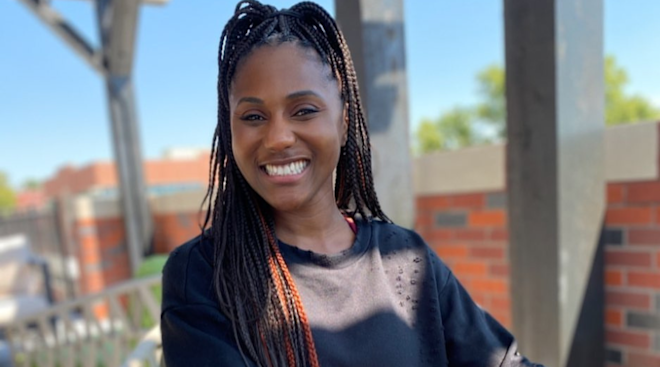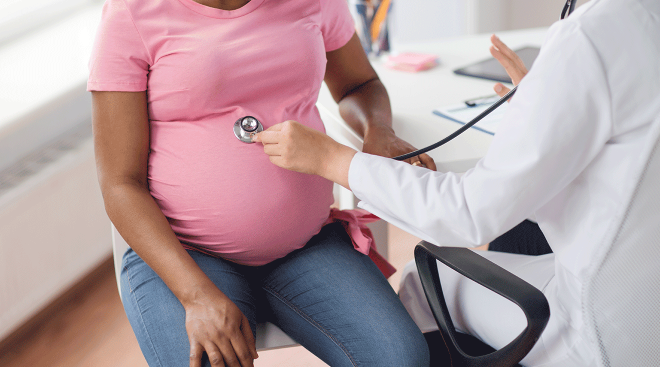Complications Black Moms-to-Be Are at Risk For—And What to Do About It
If you’re Black, the joys of pregnancy can be tempered by some seriously sobering statistics. Numerous studies have found that Black pregnant people are at higher risk for a number of conditions that can pose a danger to their health and that of their babies. What’s more, a 2021 study funded by the National Institutes of Health found that the maternal death rate for Black women is 3.5 times higher than that of white women.
Socioeconomic barriers to quality medical care play a part in these disparities, but they don’t explain everything. Additional research has found that college-educated Black women are still more likely to suffer severe pregnancy complications than white women who didn’t graduate from high school. There is a growing acknowledgement that institutional racism, bias from healthcare providers and stereotypes about Black women impact the quality of care Black moms receive. But knowing what conditions you’re at risk for and how to advocate for yourself if you suspect a problem can drastically improve outcomes.
It’s “complex,” says Latoya Hill, an epidemiologist and senior analyst at the Kaiser Family Foundation’s Racial Equity and Health Policy Program. “These disparities can partly be explained by increased barriers to accessing and using healthcare among Black people and also the quality of care they receive,” Hill says. “However, we also know that social and economic inequities, and historic and ongoing racism and discrimination contribute to driving disparities.”
This is why it’s critical for Black moms-to-be to educate themselves about the conditions and complications they’re most at risk for. Here are several major medical issues to be aware of, symptoms to watch for and tips to help you get the care you deserve.
Racism doesn’t just impact how Black people are treated—it is itself a risk factor for potentially life-threatening conditions due to the emotional and physical stress it puts on the body. “As people of color, one of the things we contend with is racism that can induce stress,” explains Kecia Gaither, MD, head of perinatal services at NYC Health + Hospitals/Lincoln Hospital. “Stress can induce production of cortisol, a stress hormone. Cortisol can decrease immune function. If your immunity is decreased, you’re at increased risk for infection.”
Cortisol can also affect your vasculature, or blood vessels, Gaither says. When a mom’s vasculature is constricted, the flow of nutrients, blood and oxygen to baby is also impaired, which can lead to small gestational age or low birth weight. And if your vasculature can’t contract to control bleeding, you can be at a higher risk for hemorrhage.
This means that self-care and stress-reducing routines aren’t just luxuries—they’re essential. “You need self-care practices that are unapologetic, things that are consistent, things that uplift your wellness,” says Jamarah Amani, a South Florida-based midwife and cofounder of the National Black Midwives Alliance. That could include regular massages, daily walks, deep breathing and meditation, prayer, support groups, having a trusted circle of friends and family and mental health services, Amani says.
According to the US Department of Health and Human Services Office of Minority Health, Black women have the highest rate of obesity compared to other groups. And obesity, which is defined as having a BMI (body mass index) over 30, can, in turn, cause a number of complications during pregnancy. “Increased risk of hypertension, diabetes, cardiac dysfunction, fetal anomalies: All these things are tied to being obese in pregnancy,” says Gaither. Obesity also increases the risk of needing a c-section and can complicate wound healing and care.
Still, even if you’re significantly overweight, you’ll want to make sure your doctor doesn’t blame everything on your BMI without investigating other possible causes, says Tangela Anderson Tull, MD, an ob-gyn with Mercy Medical Center in Baltimore, Maryland. That said, she also suggests focusing on having a healthy, nutritious diet and getting ample exercise during those nine+ months. Of course, talk to your doctor before starting any new diet or exercise routines.
Preeclampsia, a condition in which people suddenly develop dangerously high blood pressure during pregnancy, was found to be the leading cause of maternal death for Black pregnant women, according to a recent National Institutes of Health study. Additionally, as noted by a 2017 report, preeclampsia is 60 percent more prevalent in Black women than white women, and Black women are more likely to develop severe cases. It can also develop earlier in pregnancy for Black patients than the general population, so being proactive about care is key.
Anderson Tull recommends asking your doctor to regularly test your urine for protein–a common symptom of preeclampsia. This is especially important since other symptoms can be more subtle: a headache that doesn’t go away with medication, upper abdominal pain, blurred or doubled vision, shortness of breath and pain or swelling in the feet, ankles, face or hands. If you’re experiencing any of these red flags, talk to your doctor right away. It’s also a smart idea to get yourself a blood pressure cuff to use at home, Amani suggests. This way, you can take readings on your own to share with your doctor or midwife if something seems off.
Blood clots are most common in the legs or lungs, and if you suspect you have one, you should seek medical attention immediately. They can occur at any time in pregnancy but often happen in the first trimester or in the first few months after delivery.
Look out for swelling; one leg will appear larger than the other and be red or warm and tender to the touch. “Often women will say it feels like a charlie horse that won’t go away,” says Anderson Tull. Some degree of swelling during pregnancy is normal, but it shouldn’t be accompanied by pain.
Pulmonary embolism happens when a blood clot travels to the lungs from somewhere else in the body; it can be fatal. Signs include shortness of breath and chest pain. Anderson Tull suggests that if you experience any warning signs of a clot and feel dismissed by your doctor, ask for an ultrasound to rule out this very real possibility. Doing so means your request is now on the record, and it can help hold the doctor accountable.
According to the US Department of Health and Human Services Office of Minority Health, African Americans are 60 percent more likely to be diagnosed as adults with diabetes, a disease which prevents the body from producing or utilizing insulin.
Pregnant people can also suffer from gestational diabetes, which is diabetes diagnosed during pregnancy and can pose significant risks for both Mom and baby if not treated properly. The condition can increase the risk of preterm labor, preeclampsia and c-section. Baby can also grow excessively large, experience trouble breathing after birth or have low-blood sugar at birth.
Increased urination and thirst are sometimes warning signs–but it also might not cause any noticeable symptoms. It’s often identified through a screening test performed between weeks 24 and 28. But if you have certain risk factors (being obese or overweight, having polycystic ovarian syndrome or having an immediate relative with diabetes), your doctor may test you earlier.
Whether you have diabetes as a preexisting condition or gestational diabetes, it’s important to monitor your blood sugar levels, take any medication prescribed by your doctor, get regular exercise and maintain a diet rich in fruits, veggies, lean protein and whole grains and low in sugar and refined carbohydrates. “It’s really important for moms with gestational diabetes to be compliant with the routine and diet they’re placed on,” Gaither says. “While Mommy can handle high blood sugar, baby cannot.” If you’re diagnosed with gestational diabetes, blood sugar levels usually return to normal after delivery.
Fibroids are noncancerous tumors that develop in the uterus. Black women are much more likely to get them and to experience severe symptoms. While it’s not very common, fibroids can grow larger during pregnancy due to increased blood flow to the uterus, according to the Fibroid Treatment Collaborative in Chicago, Illinois. Fibroids can up the risk of miscarriage, preterm birth and breech positioning. And in rare instances, a fibroid can obstruct the birth canal, making a c-section necessary. Pain can be an indicator that a fibroid is becoming problematic, says Anderson Tull. Look out for a constant, cramping or dull pain on either side of the pelvis that doesn’t go away.
According to the Centers for Disease Control and Prevention (CDC), in 2020, the rate of preterm birth for non-Hispanic Black women was 50 percent higher than the rate for non-Hispanic white women or Hispanic women. Preterm labor, defined as any labor that begins before 37 weeks of pregnancy, can be more likely if a woman has certain health conditions, like high blood pressure, preeclampsia, diabetes or infections. But there are also social and environmental risk factors common to Black women that can increase the chances of preterm labor—things such as such as stress, low socioeconomic status and exposure to pollution, radiation or lead.
Symptoms of premature labor include a change in vaginal discharge, spotting, a constant dull ache in the lower back, pelvic pressure, cramping or regular contractions, notes the Mayo Clinic. If you have any of these signs of preterm labor, call your doctor or midwife right away. If you experience heavy bleeding or your water breaks, go directly to the emergency room.
Anderson Tull suggests that once you’ve arrived at the hospital, ask if you’re a candidate for medications that can stop contractions and give you a chance of postponing delivery. She also says that most people between 24 and 34 weeks of pregnancy should be offered steroid medication that can improve the development of baby’s lungs before birth. What’s more, if you do find yourself in early labor, don’t hesitate to ask for pain control. Anderson Tull says that in most cases, you should be offered the same options as someone with a full-term delivery.
Black women are about 1.5 times more likely to have c-sections than white women, according to a 2009 study. The reasons aren’t completely clear, but disparities in healthcare, socioeconomic differences and societal racism all individually and collectively contribute to this statistic. Black women are also more at risk for some health conditions that increase the likelihood of needing a c-section, such as preeclampsia or uterine fibroids.
If your doctor seems set on a c-section, and it’s not because of an emergency situation or existing condition, ask for an explanation, says Gaither. “The option is always there for a second opinion.”
Research has found that Black women are more likely to experience severe postpartum hemorrhage than any other race, and are more likely to die from it. The risk of hemorrhage continues for weeks after delivery, says Anderson Tull. Some amount of postpartum bleeding is normal, but “if you’re passing clots larger than an egg or larger than a golf ball, or soaking more than one pad an hour, you need to come in. That’s way too much,” says Anderson Tull.
Studies suggest that Black people have a disproportionate risk for contracting COVID-19, and that risk extends to pregnant people as well. Black women are also more likely to work in jobs where they are considered essential workers and come into close contact with other people. For example, research out of Penn State found that Black and Hispanic pregnant women in Philadelphia were five times as likely as white and Asian-American women to be exposed to COVID-19. Additionally, a higher COVID risk may be related to higher rates of diabetes and cardiovascular disease in Black people; these underlying conditions have also been associated with the occurence of more severe disease. “It’s a nasty little player that really likes bodies that are immunocompromised in some way,” Gaither says of COVID-19. “When you’re pregnant, you’re already immunocompromised because the body downplays its immune system to accommodate the growing fetus.”
Fortunately, this is one illness Black moms-to-be can take action against: “Get your COVID vaccine. COVID in pregnancy is no joke,” warns Gaither. She recommends talking to your doctor about getting a booster shot if you’re already fully vaccinated.
The reality is that Black moms-to-be need to be vigilant about their own health and prenatal care. In addition to being at risk for serious conditions, they’re unfortunately often overlooked or shrugged off by doctors and medical professionals. Implicit bias is a real problem, so women need to know how to speak up and advocate for themselves.
If something feels off, tell your doctor and mention anything unusual you’re experiencing, even if it seems mild or inconsequential, suggests Anderson Tull. It’s important that you listen to your gut—and a good doctor will listen to you. Amani suggests researching doctors who work with midwives or doulas and asking lots of questions.
Self-advocacy and persistence are key when trying to convince a doctor that you need help. “Remind them of your medical history, your family history, and be specific about your symptoms,” advises Amani. And hold your ground. “I would certainly not let it go, because sometimes these situations are the difference between life and death.”
About the experts:
Jamarah Amani, LM, is a South Florida-based midwife and the co-founder of the National Black Midwives Alliance.
Tangela Anderson Tull, MD, is an ob-gyn with Mercy Medical Center in Baltimore, Maryland. She received her medical degree from the University of Maryland School of Medicine.
Kecia Gaither, MD, is the head of perinatal services at NYC Health + Hospitals/Lincoln. She earned her medical degree from SUNY Health Science Center in Syracuse, New York.
Latoya Hill, MPH, is an epidemiologist and senior analyst at the Kaiser Family Foundation’s Racial Equity and Health Policy Program.
Please note: The Bump and the materials and information it contains are not intended to, and do not constitute, medical or other health advice or diagnosis and should not be used as such. You should always consult with a qualified physician or health professional about your specific circumstances.
Plus, more from The Bump:
Navigate forward to interact with the calendar and select a date. Press the question mark key to get the keyboard shortcuts for changing dates.


































